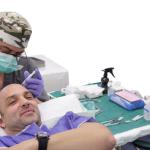Leaky Gut & Hair Loss
What is Leaky Gut?
Inside our abdomen, we have an extensive intestinal lining covering more than 4,000 square feet of surface area. Physiologically, it forms a tight barrier controlling what gets absorbed into the bloodstream. An unhealthy gut lining may have large cracks or holes, allowing partially digested food, toxins, and pathogens to penetrate the tissues beneath it. This may trigger a cascade of inflammation and changes in the gut flora (normal bacteria) that could lead to problems within the digestive tract and beyond. Multiple research and studies show that modifications in the intestinal bacteria and inflammation may play a role in developing several common chronic diseases.
Pathology of Leaky Gut
We all have some degree of leaky gut, as this barrier is not entirely impenetrable (and isn’t supposed to be!). Many may have a genetic predisposition, thus being more sensitive to changes in the digestive system, but there is more to it than genetics. Our hectic and stressful lifestyle may actually be the primary driver of gut inflammation. Our diet, if it is low in fibre and high in sugar and saturated fats, may initiate this process. Heavy alcohol use and stress also seem to disrupt this balance.
Increased intestinal permeability plays a role in certain gastrointestinal conditions like Inflammatory Bowel Disease (IBD), such as Celiac disease & Crohn’s disease.
However, there are pieces of evidence to suggest that a leaky gut may cause problems elsewhere in the body. Some studies show that leaky gut may be associated with other autoimmune diseases (Lupus, Type 1 diabetes, Multiple Sclerosis), Chronic fatigue syndrome, fibromyalgia, arthritis, allergies, asthma, acne, obesity, and even mental illness.
Causes of Leaky Gut
The following factors may lead to a leaky gut –
- Excessive sugar intake: An unhealthy diet high in sugar, particularly fructose, harms the barrier function of the intestinal wall
- Non-steroidal anti-inflammatory drugs (NSAIDs): The long-term use of NSAIDs like ibuprofen can increase intestinal permeability and contribute to leaky gut
- Excessive alcohol intake: Excessive alcohol intake may increase intestinal permeability
- Nutrient deficiencies: Deficiencies in vitamin A, vitamin D, and zinc have each been implicated in increased intestinal permeability
- Inflammation: Chronic inflammation throughout the body can contribute to the leaky gut syndrome
- Stress: Chronic stress is a contributing factor to multiple gastrointestinal disorders, including leaky gut
- Poor gut health: There are millions of bacteria in the gut, some beneficial, and some harmful. When the balance between the two is disrupted, it can affect the barrier function of the intestinal wall
- Yeast overgrowth: Yeast is naturally present in the gut, but an overgrowth of yeast may contribute to leaky gut
How is Leaky Gut related to Hair Loss?
A dysbiotic microbiome may not efficiently perform functions vital to the regulation of the hair cycle, such as supplying nutrients, synthesizing specific vitamins, and regulating aspects of the immune system. Alterations to the microbiome have the potential for permanence, compromising function, and aiding the development of myriad health problems, including potential hair loss.
IBD has various Extra Intestinal Manifestations (EIM), hair loss being one of the most common ones. Through case reports and series, hair loss has been associated with concomitant autoimmune diseases (alopecia areata, telogen effluvium) and medications commonly used in IBD.
The presence of similar inflammatory mediators can be one of the reasons why Alopecia Areata is commonly associated with IBD.
Also, IBD can lead to several nutritional deficiencies, including vitamin B12 and iron, which have been associated with hair loss. No large study exists to evaluate the associations between medications and alopecia among patients with IBD.
How to prevent or treat leaky gut
Here are a few strategies to support a healthy gut:
- Limit your refined carb intake: Harmful bacteria thrive on sugar, and excessive sugar intake can harm gut barrier function.
- Take a probiotic supplement: Probiotics are beneficial bacteria that can improve your gut health. Probiotic supplements have been shown to be beneficial for gastrointestinal diseases.
- Eat fermented foods: Fermented foods, such as plain yogurt, kimchi, sauerkraut, kefir, and kombucha, contain probiotics that can improve gut health
- Eat plenty of high-fibre foods: Soluble fibre, which is found in fruits, vegetables, and legumes, feeds the beneficial bacteria in your gut.
- Limit the use of NSAIDs: The long-term use of NSAIDs like ibuprofen contributes to leaky gut syndrome.
How to prevent or treat Leaky Gut-Related Hair Loss
These are the ways you can correct hair loss due to leaky gut –
- Correct diagnosis – Ensure that the alopecia is diagnosed by a qualified dermatologist or in a reputed clinic. Your doctor may request a blood test to find out the nutritional deficiency level.
- Nutritional supplements – Post diagnosis, you will need to take the necessary dietary supplements prescribed by your specialist.
- Proper treatment – Medication and topical treatments are the mainstays. Newer modalities like JAK inhibitors could be the future.
- Interventional modalities – Intra-lesional Corticosteroids provide very good results. It is to be taken every six weeks, strictly under medical supervision.
- Platelet Rich Plasma – A relatively newer interventional therapy for hair loss. The growth factors released from the platelets help stop hair fall.
- Use of paraben and sulfate-free shampoo.
- Use of antioxidant hair serums.
If you would like more information, don’t hesitate to call us on 1800-103-9300 or book your consultation







